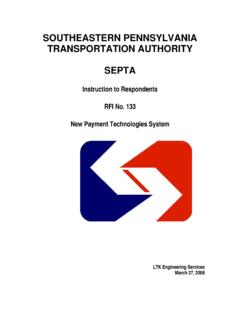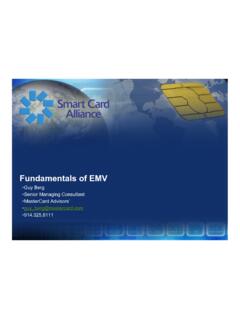Transcription of Smart Cards and Healthcare Providers
1 Smart Card Alliance 2013 Page 1 In this FAQ 1. What is a Smart card? 2. How can Smart Healthcare Cards help Providers ? 3. How can Healthcare Cards help hospitals? 4. Are any hospitals or Healthcare systems currently using Smart Cards ? 5. How can Smart card technology improve critical or emergency care? 6. What are the IT requirements for Smart Healthcare card support? 7. Is an in-place electronic medical records system required to benefit from Smart Healthcare Cards ? 8. What are the benefits of using Smart Healthcare Cards with an EMR/EHR system? 9. Can Smart Healthcare Cards connect multiple medical record numbers for secure ID verification? 10. Can Smart card application software integrate into current provider software systems? 11. How can patient resistance to a Smart card deployment be minimized? 12. How can a patient get a treating physician s records into a personal health record if that physician does not have an electronic health record system?
2 13. Can one Smart Healthcare card be used by different Providers ? 14. Will using Smart Healthcare Cards change an organization s work flow? 15. Can Smart Healthcare Cards be used offline? 16. Who pays for a Smart Healthcare card? 17. What fixed and variable costs are associated with issuing Smart Healthcare Cards ? 18. Can Smart Healthcare Cards deliver long-term financial benefits to Providers ? 19. What is the ROI for Smart Healthcare Cards ? 20. What are the implications Smart Healthcare Cards for insurance co-payments? 21. What are some approaches for branding and community engagement? 1. What is a Smart card? A Smart card is a small card or similar device with an embedded integrated circuit chip. What makes the card Smart is the embedded chip. The chip is a powerful minicomputer that can be programmed for different applications. The chip enables a Smart card to store and access data and applications securely and exchange data securely with readers and other systems.
3 Smart card technology can provide high levels of security and privacy protection, making Smart Cards ideal for handling sensitive information such as identity and personal health information. For additional information on Smart card technology, see the About Smart Cards FAQ. Smart Card Technology in Healthcare : FAQ Series Smart Cards and Healthcare Providers Smart Card Alliance 2013 Page 2 2. How can Smart Healthcare Cards help Providers ? Smart card-based systems can support numerous applications and capabilities that are important to Healthcare Providers : Accurate patient identification across organizational and geographic boundaries Integration with health information exchange Enterprise Master Patient Index (EMPI) and record locator systems Prevention of the issuance of duplicate IDs and ID Cards Ability to identify all locations (at the Healthcare information exchange level)
4 Where a patient identifier has been used Resistance to counterfeiting Risk mitigation for identity theft, data breaches, and fraudulent use Support for reporting, quality assurance, and education Mitigation of legal and financial liabilities Ability to securely store patient identifiers and support deactivation of lost identifiers Recording and updating patient demographic data and data copying, data reporting, and interface with other Healthcare information systems Accurate patient identification across the provider network and different systems and acknowledgement of conflicting medical identifiers nationally Integrated verification of patient identity using external sources (such as Lexis Nexis or Veratad) Multifactor authentication using photos, PINs, biometrics, and graphical passwords. Support for emergency medical services, including providing data to authorized response personnel and tracking patient location during a disaster Confirmation of patient identity for Medicaid/Medicare/Children s Health Insurance Program (CHIP) claims Verification of insurance, co-pay, deductible, and HSA at time of service Payment collection, using the card for a financial transaction Automatic check-in at a provider kiosk Data audit trails and date stamps at locations used Secure, convenient access to patient health information by Healthcare Providers using Smart Healthcare Cards for identity authentication Interoperability with a range of portable devices, allowing Healthcare Providers to access patient information on mobile platforms/devices or via VPNs 3.
5 How can Smart Healthcare Cards help hospitals? Smart Healthcare Cards can significantly reduce hospital administrative costs while maintaining or improving current levels of quality of care and customer service. Use of a Smart Healthcare card can benefit hospitals in several ways: Improved patient identification Increased administrative efficiency Improved medical records management Improved quality of care Increased privacy, security, and confidentiality Smart Card Alliance 2013 Page 3 Improved patient identification. Real-time verification is a superior method for confirming the identity of an incoming patient, and Smart Cards can be highly reliable and secure identifiers. The Cards can securely store various identity credentials (such as a PIN, photo, or biometric) on the card and make it very difficult to forge or steal the credentials.
6 A Smart card can also support digital signatures, which can guarantee that information has not been modified. Smart Cards therefore can represent a considerable barrier to medical identity theft and fraud. Increased administrative efficiency. The time and resources required to admit a patient are critical measurements of hospital efficiency. Busy waiting rooms, thin staffing levels, language barriers, and manual transcription of important data from handwritten forms all create opportunities for error. Smart Healthcare Cards can decrease the time required for admissions by providing immediate access to accurate, up-to-date patient information. Moreover, the set of information typically provided by the patient can be obtained through an online preregistration process and downloaded onto a Smart card. Last, admissions can be streamlined when patients use Smart Cards at unmanned kiosks, removing the labor element altogether.
7 These efficiency gains can result in lower costs, 1 reduce errors,2 and improve the patient experience. Smart Cards issued as health provider identifications can provide secure, affordable remote access to patient health information via a range of devices. As a result, health Providers can increasingly access information when/where they need it in a convenient, user-friendly manner. Secure remote authentication for Providers . Smart card technology meets or exceeds recommendations being put forth by the Office of the National Coordinator for Health IT Privacy & Security Tiger Team, providing support for both NIST Level 3 and Level 4 Improved medical records management. Linking a patient to that patient s medical records seems like a simple process, but human error often prevents the correct match of patient and records. Using a Smart Healthcare card to tie a patient to a specific medical record can ensure a more comprehensive and accurate patient health record.
8 Smart Healthcare Cards can significantly decrease the incidence of and expenses associated with duplicate record creation,4 improving both administrative functions such as billing and registration and continuity of care. Improved quality of care. One key benefit of using Smart Healthcare Cards is a potential reduction in the number of medical errors and the quantity of duplicative medical testing. More than 195,000 deaths occur in the United States because of medical error, with 10 out of 17 medical error deaths each year due to wrong patient Smart Cards can contribute to better care by authenticating the identity of the person receiving medical treatment. The ability to accurately link a patient to an institution s medical records potentially reduces the number of adverse events and medical errors that occur due to lack of patient information.
9 Increased privacy, security, and confidentiality. Because a Smart Healthcare card is in the possession of the patient, and because information is supplied by Providers in an approved network with audit capabilities, Smart Cards can provide privacy and security well beyond the requirements of HIPAA 1 , Staunching Hospitals Financial Hemorrhage with Information Technology, Health Management Technology, August 2003. 2 Health Grades, In- hospital Deaths From Medical Errors at 195,000 per Year, Health Grades Study Finds, July 2004, 3 How to Authenticate Physicians' IDs, HealthcareInfoSecurity, July 26, 2012, 4984 4 Smart Card Alliance, A Healthcare CFO s Guide to Smart Card Technology and Applications, February 2009. 5 Robin Hess, Identity Crisis, For the Record, January 17, 2005.
10 Smart Card Alliance 2013 Page 4 regulations. The patient information on a Smart card can be encrypted using robust standard cryptography methods that are extremely secure. Smart card technology can also buttress internal hospital security systems. Using Smart Cards as employee IDs can enable hospitals to limit an employee s physical access to the specific buildings and areas within buildings (including medication cabinets) that are appropriate for that employee s responsibilities. Smart employee IDs can also be used to authenticate employees for access to networks and computers. 4. Are any hospitals or Healthcare systems currently using Smart Cards ? Countries throughout Europe and Asia are providing their citizens with Smart Cards . Some use the Cards in their national Healthcare programs. Others have Smart card-based national ID programs.








